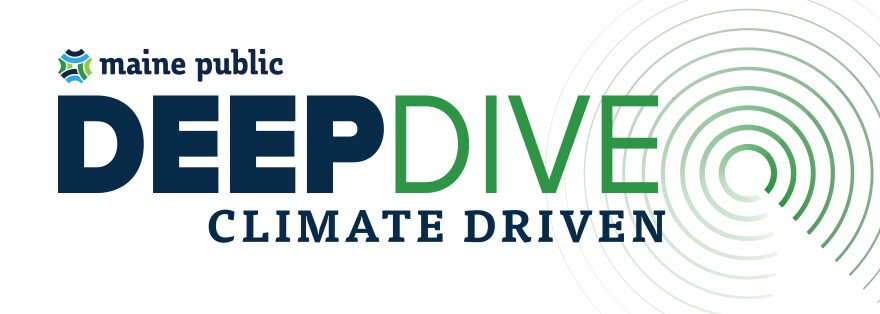About 10 years ago, Unity College announced a plan to divest its endowment from fossil fuels — making it the first school in the country to do so.
In the decade since, the movement has snowballed, with hundreds more institutions following in Unity's steps. But it's still unclear just how much of an impact the movement has had on the fossil fuel industry.
This story is part of our series "Climate Driven: A deep dive into Maine's response, one county at a time."
In Nov. 2012, climate activist Bill McKibben stood in front of the crowd at Portland's State Theatre and issued a call to action.
McKibben declared that if enough colleges, universities and other institutions divested their portfolios from fossil fuels, it could weaken the industry's power and influence.
And he praised Maine's Unity College for being the first to act.
"And I've got to say, I graduated from Harvard," McKibben told the audience. "But this week, I would be prouder if I had graduated from Unity College."
But while supporters applauded the first in-the-nation decision, campus leaders say the action wasn't easy, even for a school that had branded itself "America's Environmental College."
"I literally couldn't sleep at night," said Stephen Mulkey, who was Unity's president at the time. "I didn't think there was any way my board would do it. But my wife will tell you that I used to sit up and think about it, because I felt like we had a moral obligation to do it."
Mulkey said the stakes were high for a small school with a relatively tiny endowment of about $12 million.

"Because that's all we had," he said. "If we lost it, because we were missing out on opportunities in the market, or were investing improperly, then it would have more consequences."
But the endowment not only survived, but grew in value. Trustees approved the plan that reduced the endowment's fossil fuel exposure to less than 1% in just 18 months.
For many young climate activists, Unity's decision served as something of a proof-of-concept for what they could accomplish at their own schools.
"We were looking at it, and saying, 'Wow, these are small schools and small endowments. So they're taking an even bigger risk by divesting from fossil fuels. And they're still functioning, they're still operating their colleges and universities,'" said Chloe Maxmin, a former Maine legislator.
In the fall of 2012, Maxmin was a college sophomore who had helped launch a divestment campaign at Harvard. She said Unity's financial success demonstrated to her that the strategy could work.
"Harvard's got $40 billion, compared to Unity's endowment, like $13 million, or something like that," Maxmin said. "To me, it was an example of how it can be done without sacrificing an institution."
Similar divestment campaigns popped up at campuses across the country. An online database now reports that thousands of institutions have committed to divest worldwide, with their investments totaling more than $40 trillion.
The University of Maine System voted to divest last year. The year before, Maine lawmakers passed a bill to divest the state's public retirement system, with a value estimated at more than $15 billion.

But, as more and more colleges join the movement, has divestment actually achieved its early goals, of curbing the fossil fuel industry's power over the economy and the government?
"Our study, it certainly is not proof that there has been no impact. But it is evidence that the impact has been small," said Tyler Hansen, a researcher at the Technical University of Denmark.
As a Ph.D. student two years ago, he found that only a tiny fraction of institutions' portfolios had actually been fully divested from fossil fuels. And he found no evidence that it affected stock prices.
"So there may be a small drop in the share price immediately right after a commitment, but then that's a chance for other investors to potentially actually buy up the shares at a lower price," Hansen said.
But even as oil companies now report sky-high profits, activists say the divestment movement has made a big impact elsewhere. McKibben points to recent documents from Shell and Peabody Energy acknowledging that the movement could affect their ability to access capital.

Politically, McKibben said the movement has helped to stigmatize and weaken the power of the fossil fuel industry.
He notes that many of the young people who started on college divestment campaigns helped to form the Sunrise Movement, the youth political advocacy group that pressured lawmakers to support the Green New Deal.
"And it was the Green New Deal, in vastly watered down and shrunken form, that the Congress finally passed this summer, in the guise of the Inflation Reduction Act," McKibben said. "So this has been a highly successful campaign in many, many different axes. But it really did have its first great shot of adrenaline the day that Unity College did the right thing."
Back at Unity College, current and past officials said the school's early decision resonated across the campus for years. Mulkey said it helped to attract attention and gifts from outside donors to help revitalize classrooms and infrastructure.
And current President Melik Khoury said he's proud that Unity played a small role in sparking a worldwide conversation about fossil fuels that may not have happened otherwise.
"But I think if we hadn't divested, if that hadn't caught on, would we be having that conversation now?" Khoury said. "I guess we'll never know. And I'm glad we'll never know, because we made that decision."




